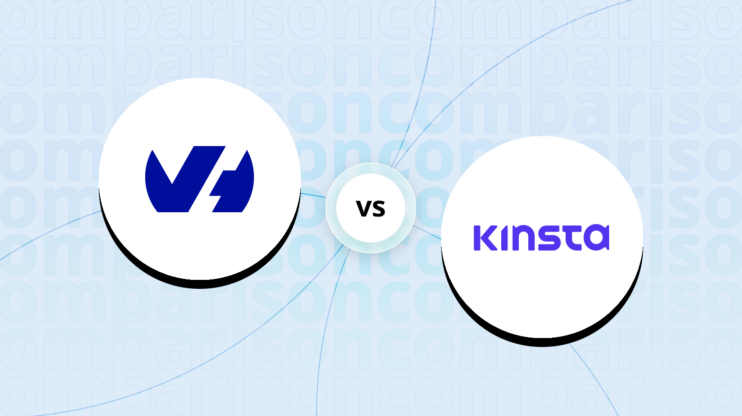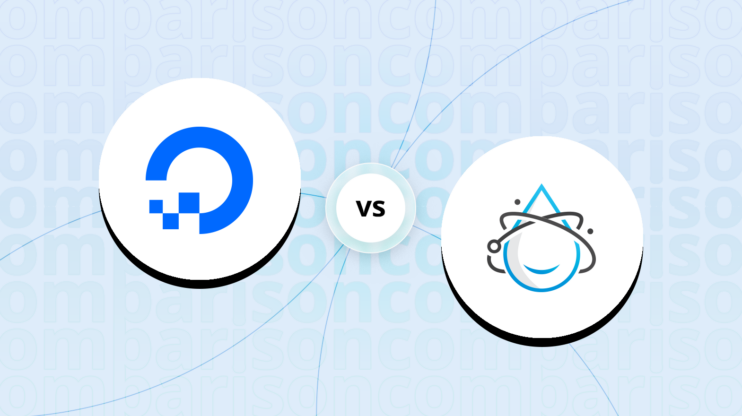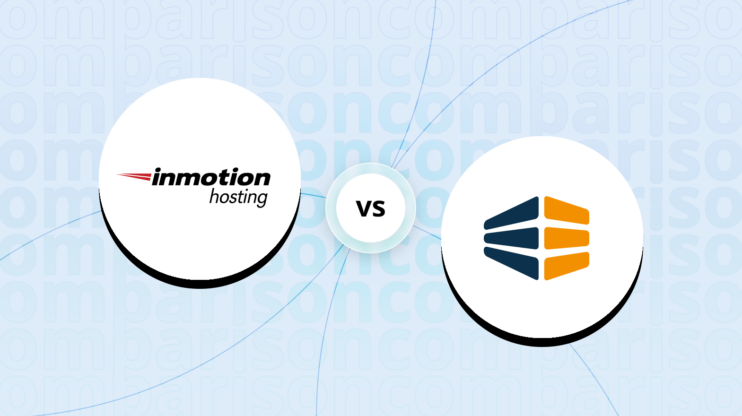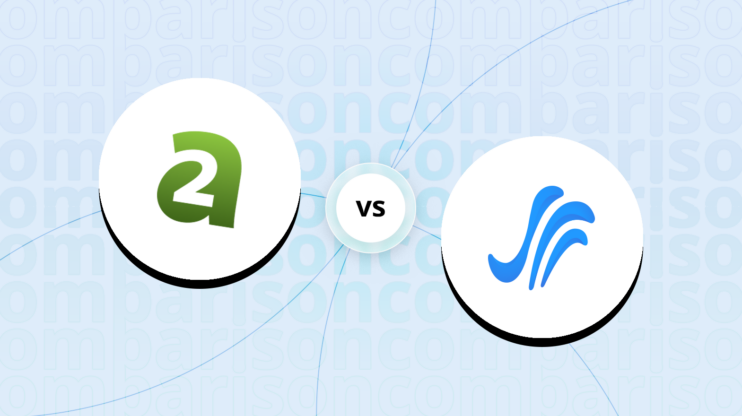Digital Ocean vs WestHost: Final verdict
Looking over DigitalOcean vs. WestHost, it’s clear why both hosts are so popular. They have both hosted millions of
websites that run on WordPress for decades, building up a loyal customer base.
-
DigitalOcean (Overall grade: 8.3)
stands out for its high performance and developer-friendly environment. Offering impressive scalability options, robust security measures, and superior uptime, it is ideally suited for agencies and high-traffic websites. The flexible and customizable Droplets, combined with advanced features like automatic backups, DDoS protection, and strong compliance certifications, make DigitalOcean a top choice for tech-savvy users and developers. However, its more technical setup might be daunting for beginners, and it lacks a built-in website builder, which could limit its appeal to non-technical users. -
WestHost (Overall grade: 7.8)
excels in affordability and ease of use, making it a preferred option for small businesses and personal bloggers. It offers shared hosting, dedicated hosting, and a user-friendly control panel (StackCP), alongside unlimited FTP users and free domain registration with annual plans. Features such as automated backups, fraud, virus, and spam protection, and an integrated website builder streamline the experience for less technical users. While WestHost provides reliable service and ample support, its outdated documentation and the need for manual intervention in some areas may pose challenges for users expecting seamless automation.
 Overall grade:8.3 |
 Overall grade:7.8 |
|
|---|---|---|
| Uptime and Availability | 9.2 | 7.8 |
| Hosting Performance | 8.8 | 8.3 |
| Hosting Security | 9.1 | 8.0 |
| Price | 8.7 | 8.5 |
| Hosting Features | 6.9 | 6.5 |
| Ease Of Setup | 8.2 | 8.2 |
| User Management | 8.0 | 7.2 |
| Customer Support | 7.8 | 7.7 |
| User feedback | 4.6/5 | 3/5 |
Hosting types offered
Both platforms provide a variety of hosting types, each designed to meet the different needs of users.
 |
 |
|
|---|---|---|
| Shared hosting | ||
| Cloud hosting | ||
| WordPress hosting | ||
| Ecommerce hosting | ||
| VPS hosting | ||
| Dedicated hosting |
Although both offer a variety of hosting plans tailored to different needs, in
certain cases, one platform may prove to be more suitable.
features for long-term business needs.
Detailed comparison
Uptime and availability
Evaluates the average uptime statistics, uptime guarantee and overall availability of the hosting
provider
Score Components:
- Uptime percentage (30%): evaluates the uptime statistics in given period of time
- Uptime guarantee (20%): Assesses if the platform offers an uptime guarantee and
whether the actual uptime matches the promised guarantee. - General performance (25%): Evaluates how fast is the average response time and overall
it’s stability. - Responsiveness (10%): Adaptability to different devices and screen sizes.
- Availability (25%): Reflects the total downtime and number of outages.
 9.2
9.2
 7.8
7.8
🏆 Winner DigitalOcean: Offering exceptional uptime, real-time alerts, and a 99.99% uptime SLA, DigitalOcean sets a high standard in hosting.
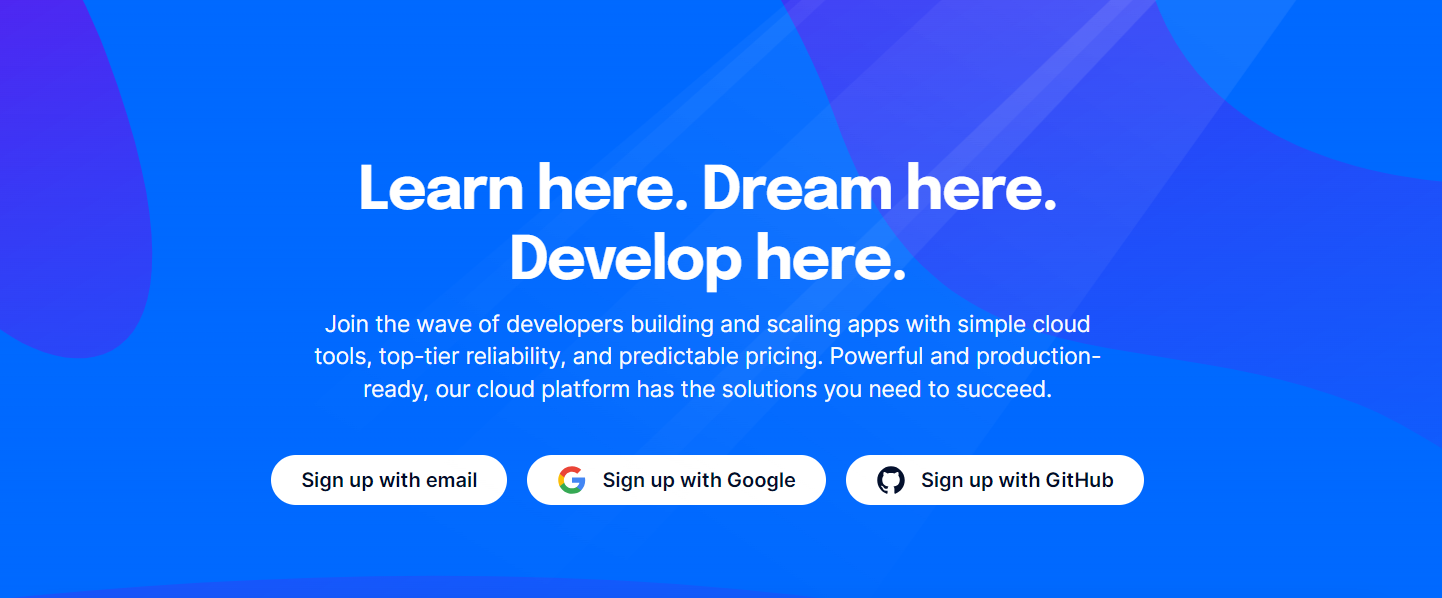
DigitalOcean features real-time uptime and latency alerts via Slack or email, global monitoring, and customizable alerts. It supports endpoint monitoring from four regions with precise latency detection. Their 99.99% uptime SLA, multiple data centers, high-quality infrastructure, and load balancers ensure reliable and efficient service delivery. Automated backups, snapshots, and stringent security measures keep data safe and operations smooth.

WestHost, without an explicit uptime guarantee, recorded 100% uptime in a one-month monitoring period. Their data centers provide strong redundancy and security measures, but speed performance rated average. With a service level agreement of 99.995% and global presence, the hosting is reliable, though not explicitly backed by clear uptime guarantees.
Which one has better hosting performance?
Score Components:
- Hosting speed (30%): This includes SSD quality, Load times, PageSpeed score ranges,
additional information on website speed, built-in plugins for performance enhancement, available caching
methods, and CPU/RAM options - CDN (20%): Considers whether CDN is available or not, whether it’s free or paid, and
the quality of the CDN service - Available data centers (30%): Evaluates the number of data centers and their locations
globally. - Scalibility (20%): Looks at whether elastic scaling is available, the process required
to scale (manual upgrade vs. automatic scaling), the presence of dedicated servers, and the costs
associated with scaling.
 8.8
8.8
 8.3
8.3
🏆 Winner: DigitalOcean: Superior performance and flexibility for modern developers.
DigitalOcean and Westhost each offer significant hosting capabilities, but DigitalOcean edges out with its stellar combination of performance, flexibility, and developer-friendly features. Both utilize SSD storage for rapid load times and implement CDN capabilities to enhance site performance. DigitalOcean stands out with its scalable Droplets, customizable options, and diverse data centers across 14 locations globally. Additionally, it offers robust caching mechanisms and real-time monitoring, which can be crucial for maintaining site speed and performance.
Website Speed
DigitalOcean excels in website speed with its emphasis on SSD storage, efficient caching mechanisms, and CDN integration. The App Platform simplifies deploying applications while maintaining optimal performance. Westhost also provides SSD storage and features a fast VPS Cloud Hosting option. However, DigitalOcean’s automatic backup, load balancing, and horizontal scaling are more advanced and seamlessly integrated.
Scalability
For scalability, DigitalOcean offers elastic scaling through its Droplets, allowing automatic adjustments based on need. This flexibility helps manage traffic spikes effortlessly without needing to manually upgrade plans. Westhost, while offering scalable VPS options, doesn’t provide specific information on elastic scaling. Scaling on Westhost appears to be more plan-dependent and may require manual upgrades, potentially making it less convenient compared to DigitalOcean’s solutions.
Which one has better security features?
and regulatory requirements
Score Components:
- Technical security measures (40%): This includes encryption, firewalls, DDoS
protection, secure configurations, server monitoring, access control and availability of security addons
(e.g Sitelock security). - Operational security measures (30%): Encompasses data privacy, backups and data
redundancy. - Compliance and certifications (20%): Adherence to legal and regulatory requirements
(e.g., GDPR, HIPAA) and possession of certifications (e.g., ISO 27001, SOC 2). - Business and reliability (10%): Factors in the provider’s reputation, uptime
guarantees, and customer support.
 9.1
9.1
 8.0
8.0
🏆 Winner
DigitalOcean: Offers a broader range of advanced security features and compliance certifications.
Technical security measures:
DigitalOcean stands out with advanced technical security measures, including DDoS protection, a web application firewall (WAF), and secure SSH access. It also supports various PHP versions, providing flexibility for different applications. DigitalOcean ensures automated backups and data encryption at rest and in transit, bolstering data integrity and confidentiality. On the other hand, Westhost offers unlimited free SSL certificates, FTPS access, and SiteLock security, which includes fraud, virus, and spam protection. While robust, Westhost’s measures do not match the comprehensive scope of DigitalOcean’s offerings.
Operational security measures:
DigitalOcean demonstrates strong operational security, supporting two-factor authentication and providing cloud firewalls for protection against unauthorized access. The hosting service’s automatic backups and SSH access further enhance secure server management. In comparison, Westhost delivers 99.9% uptime, 24/7 expert support, and managed security clean-up services for a flat fee if a breach occurs. Both provide solid operational security, but DigitalOcean’s additional measures such as VPCs and managed databases give it an edge.
Compliance and certifications:
DigitalOcean is well-reputed for its compliance certifications, including GDPR, PCI-DSS, SOC 2 Type II, SOC 3 Type II, ISO/IEC 27001:2013, and CSA STAR Level 1, among others. This range meets various international and industry standards for security and privacy. Westhost, while GDPR-compliant under the EU – U.S. Privacy Shield framework, does not specify PCI compliance, which is a notable gap compared to DigitalOcean.
 |
 |
|
|---|---|---|
SSL certificate |
Yes |
Yes |
Additional security features |
Yes |
Yes |
PHP versions |
Various |
5.3 to 8.2 |
GDPR compliance |
Yes |
Yes |
HIPAA compliance |
Not specified |
Not specified |
PCI compliance |
Yes |
Not specified |
Hosting features
Score Components:
- Domains (20%): Assesses the availability of a free domain, domain purchase options, and
pricing - Email (15%): Considers if the provider offers full email hosting, or is reselling
third-party service, and if the email is only transactional or not - Website builder (15%): Checks if website builder is available, and it’s user
friendliness and overall the level of customization allowed. - Staging environment (20%): Determines if a staging environment is available, allowing
for testing changes before going live. - FTP & SFTP accounts (10%): Evaluates if and how easily users can access FTP and
SFTP accounts - Git and SSH access (20%): Assess whether Git is integrated into the hosting service and
if SSH access is provided
 6.9
6.9
 6.5
6.5
🏆 Winner
DigitalOcean: Tailored for users seeking robust performance and a wide range of hosting options.
DigitalOcean and WestHost cater to different user needs through a variety of offerings. DigitalOcean stands out with a more technical focus, providing detailed options like VPS Hosting, Managed Kubernetes, and Managed Databases, making it ideal for developers and tech-savvy users. It boasts advanced security features such as DDoS protection, firewalls, and two-factor authentication, alongside a 99.99% uptime SLA and high-speed networking. On the user-friendliness front, DigitalOcean benefits from a strong community and extensive documentation, although it may not offer a straightforward website builder compared to other platforms. The inclusion of additional services, like Virtual Private Cloud (VPC) and Load Balancers, positions DigitalOcean as a versatile solution for scalable web applications.
WestHost, on the other hand, is aligned more closely with users who prioritize ease of use and affordability. Starting at $1/month, it offers user-friendly features such as an Easy Application Installer with over 80 free applications and a user-friendly control panel (StackCP). WestHost includes unlimited FTP users and free domain registration with annual plans, which are appealing for personal bloggers and small businesses. Despite having a lower uptime guarantee of 99.9%, WestHost provides a 30-day money-back guarantee and free migration. Fraud, virus, and spam protection, alongside free SSL certificates and automated backups, ensure comprehensive, hassle-free service for less technical users.
 |
 |
|
|---|---|---|
Free domain |
No |
Yes, with annual plan |
Free SSL |
Yes |
Yes |
Email hosting |
Yes |
Yes |
Website builder |
No |
Yes |
Staging environment |
No |
No |
FTP & SFTP accounts |
Yes |
Yes |
Git and SSH access |
Yes |
Yes |
Free backup |
Yes |
Yes |
Money back guarantee |
No |
Yes, 30 days |
a location. As a result in rare cases the features mentioned here can differ from the ones you see on their websites.
Both providers support a range of users from beginners to experts with user-friendly website builders and WordPress staging areas. However, in terms of developer tools, both DigitalOcean and WestHost offer robust options including SSH access, support for multiple programming languages, and Git for version control, thus appealing to developers looking for advanced capabilities.
Email services:
Email services at WestHost are provided through a partnership with Microsoft 365, offering a professional email and access to Outlook on a trial basis before transitioning to a paid service. Conversely, DigitalOcean provides unlimited free professional email accounts, which is particularly beneficial for users requiring multiple email accounts without incurring additional costs.
Price
Score Components:
- Plan value (40%): What each pricing tier offers.
- Transparency and clarity (30%): Clearness of pricing structures.
- Flexibility of plans (20%): Range of options to suit different budgets.
- Hidden costs (10%): Additional expenses not included in the plan.
 8.7
8.7
 8.5
8.5
🏆 Winner DigitalOcean:A versatile hosting provider with a comprehensive range of options and competitive pricing.
Evaluating the pricing of plans among various hosting providers can be complex due to their differing pricing and renewal strategies. Additionally, certain plans require annual commitments, which adds to the difficulty of making comparisons. The prices listed are based on monthly commitments; plans requiring annual commitments are indicated. Additionally, although some providers offer identical plans for WordPress and shared hosting, we have created separate tables for each to enhance clarity.
DigitalOcean and Westhost offer a range of hosting plans suitable for various needs. DigitalOcean provides options starting at $4/month for shared CPU droplets, and extensive VPS and dedicated droplet plans that scale up to $131/month based on performance requirements. Westhost’s shared hosting plans start at $3.75/month with renewals at $5.00/month, and VPS hosting begins at $8.00/month. DigitalOcean’s premium features include 99.99% uptime SLA, comprehensive DDoS protection, and easy 1-click app installations, while Westhost offers unmetered bandwidth and free domain registrations. Both providers include backup options and free SSL certificates in their higher-tier plans.
 |
 |
|---|---|
|
WordPress Hosting$4/month
1-Click WordPress installation, Managed via Cloudways, Free SSL, Automatic backups, DDoS protection, $100 in free hosting credits Value for price:8.7
|
Essential$5.00/month
1 Website, 25GB Storage, 1 x 10GB Mailbox, Free Domain, Unmetered Bandwidth, Unlimited Let’s Encrypt SSL, Backups, 80+ One-Click Apps, StackCP Value for price:8.2
|
 |
 |
|---|---|
|
Website Hosting$4/month
Simple and reliable cloud hosting, 99.99% uptime SLA, 14 global data centers, 1-click apps, Transparent pricing Value for price:8.7
|
Professional$16.00/month
25 Websites, 75GB Storage, Unlimited Mailboxes, Free Domain, Unmetered Bandwidth, Unlimited Let’s Encrypt SSL, Backups, 80+ One-Click Apps, CDN, StackCP Site Builder Value for price:8.3
|
 |
 |
|---|---|
|
VPS Hosting (Shared CPU Droplets): Regular$4/month*
Shared processing power Value for price:8.5
|
VPS1GB$8.00/month
1GB RAM, 25GB SSD, 3TB Bandwidth, 4 Core Value for price:8.1
|
|
Premium$7/month*
Enhanced memory, NVMe SSDs Value for price:8.7
|
VPS2GB$16.00/month
2GB RAM, 50GB SSD, 4TB Bandwidth, 4 Core Value for price:8.4
|
|
Dedicated CPU Droplets$42/month*
4GB memory, 25GB SSD, 4TB transfer Value for price:8.5
|
VPS4GB$32.00/month
4GB RAM, 100GB SSD, 6TB Bandwidth, 4 Core Value for price:8.5
|
|
Memory-Optimized Droplets$84/month*
16GB memory, 50GB SSD, 2vCPUs, 4TB transfer Value for price:8.3
|
VPS8GB$64.00/month
8GB RAM, 200GB SSD, 8TB Bandwidth, 4 Core Value for price:8.6
|
|
Storage-Optimized Droplets$131/month*
16GB memory, 300GB SSD, 4TB transfer Value for price:8.4
|
VPS16GB$128.00/month
16GB RAM, 400GB SSD, 8TB Bandwidth, 4 Core Value for price:8.5
|
Enterprise plans
DigitalOcean’s enterprise plans include advanced Dedicated CPU and Memory-Optimized Droplets, starting at $42/month and scaling up to $131/month, offering enhanced processing power, memory, and storage. These plans cater to high-demand applications and provide SSH access, automatic backups, and extensive DDoS protection. Westhost offers a range of VPS options up to 16GB RAM and 400GB SSD for $128/month, ideal for enterprises requiring large storage and bandwidth capacities with robust server performance. Both providers present strong enterprise solutions, but DigitalOcean edges out with more flexible scaling and performance enhancements.
Digital Ocean vs WestHost: Ease of setup
platform.
Score Components:
- Site migration (25%): Assesses whether the provider offers tools for site migration,
either automated or manual, and whether these services are free or require a fee. - Admin panel usability (35%): Evaluates the type of admin panel provided, such as the
standard cPanel or a custom solution, focusing on its accessibility and user-friendliness for both
technical and non-technical users. - Setup features (20%): Examines the availability and ease of use of various setup
features, including FTP accounts, file managers, email account setup, PHPMyAdmin, and easy CDN
configuration. - Help center quality (20%): Measures the quality and accessibility of the provider’s
help center resources, including articles and tutorials.
 8.2
8.2
 8.2
8.2
🏆 Winner DigitalOcean: DigitalOcean excels in providing a robust yet user-friendly environment for setting up and managing websites.
DigitalOcean utilizes a straightforward approach to administration with its Droplets, which are customizable virtual machines. This allows technical users to precisely configure their hosting environment. For those less tech-savvy, DigitalOcean offers 1-Click Apps and a user-friendly App Platform to easily deploy and manage websites and applications without needing extensive knowledge of server management. This combination of flexibility and simplicity provides a balanced solution catering to both experienced developers and beginners.
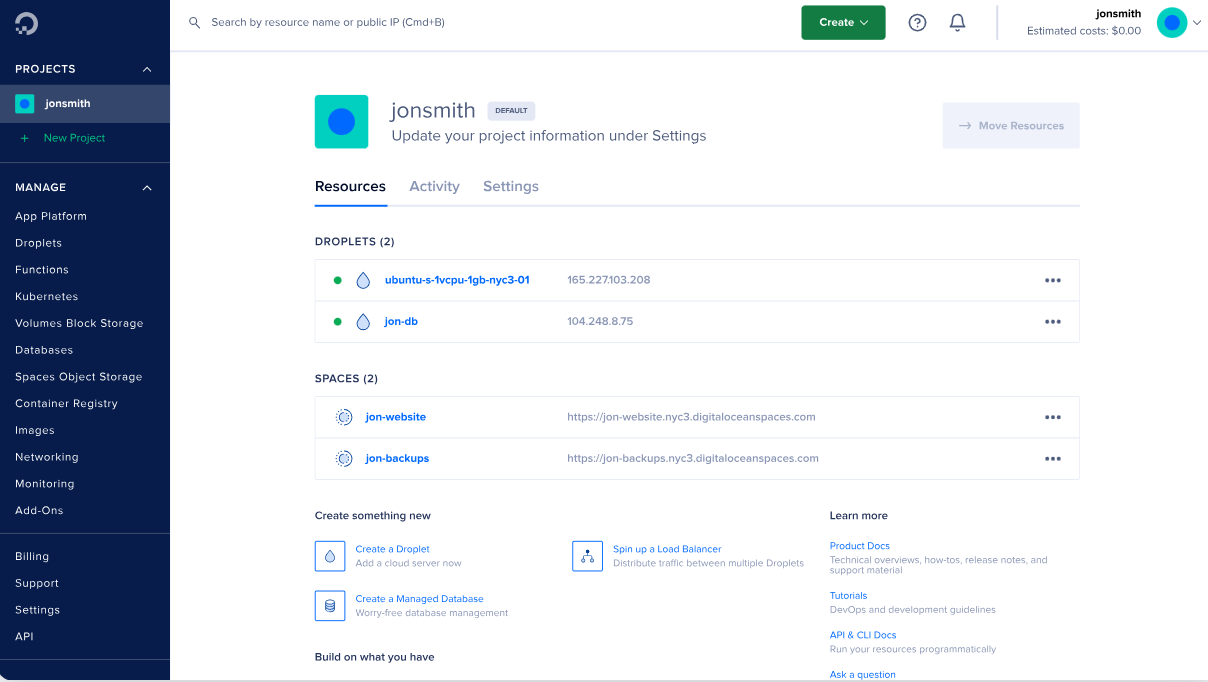
Westhost, on the other hand, equips its users with a standard cPanel, a widely recognized control panel in the hosting field. This panel’s familiarity and ease of use can benefit users of all experience levels. The integrated one-click app installs for popular applications such as WordPress and Joomla make website management accessible even to those with minimal technical expertise. The inclusion of a website builder tool further simplifies the process, allowing even non-technical users to develop and publish a website efficiently.

Both DigitalOcean and Westhost offer various tools for site migration. DigitalOcean’s Droplets can be customized to facilitate both automated and manual migration processes. Available through their comprehensive documentation and community support, these resources can help users smoothly transition their websites. The Cloudways service, which manages migrations as part of their offering, adds another layer of convenience. Westhost provides a dedicated migration center to guide users through the process. While the migration tools are readily accessible on both platforms, Westhost’s solutions are part of their standard offering, making them beneficial for users uncomfortable with manual migrations.
DigitalOcean and Westhost excel in providing quality and accessible help center resources. DigitalOcean’s extensive documentation, tutorials, and active community ensure users can find solutions to most issues. Westhost’s knowledge base covers a wide array of topics, from domain management to advanced server issues, and includes options for live chat and 24/7 technical support via ticketing. These comprehensive help centers provide essential support for users regardless of their technical proficiency.
User management
accessibility.
Score Components:
- Role customization (40%): Flexibility in creating and defining user roles and
permissions. - Ease of management (30%): User interface and tools for managing users.
- Access control (20%): Effectiveness of access control measures for different user
levels. - Scalability (10%): Ability to manage a growing number of users efficiently.
 8.0
8.0
 7.2
7.2
🏆 Winner: DigitalOcean: A highly flexible and scalable hosting provider with superior user management features.
DigitalOcean and WestHost both offer distinct user management features, but with some notable differences. DigitalOcean allows for a more granular approach to user roles and permissions, featuring roles such as Owner, Biller, and Member with varying access levels. Team owners in DigitalOcean can invite and manage an unlimited number of members, ensuring flexibility in growing teams. On the other hand, WestHost focuses on Email and FTP Users, each with specific capabilities. While DigitalOcean excels in role-based access control, WestHost’s user management is more straightforward, catering to basic email and FTP needs.
DigitalOcean provides a streamlined interface for managing team memberships, including inviting new members, viewing membership details, and adjusting roles quickly. The interface is user-friendly and offers visibility into each team member’s sign-in method. WestHost employs a simpler system, where users can be created, edited, or deleted through its Site Manager interface. While managing users in WestHost is straightforward, it requires manual steps to adjust settings and quotas, which may be cumbersome for large teams.
In terms of access control measures and scalability, DigitalOcean stands out with its comprehensive role management and flexibility to invite an unlimited number of team members. Team owners can easily scale up by inviting new members and assigning appropriate roles. WestHost, though functional, may face challenges when managing a growing number of users, as each user must be individually configured for email or FTP access, adding complexity to the process. DigitalOcean’s approach ensures efficient management even as the team expands.
DigitalOcean User Roles Table:
| Role | Description | Access Highlights |
|---|---|---|
| Owner | Full access to all resources and settings. | Access to shared resources, billing info, team settings |
| Biller | Manages billing only. | Full access to billing information |
| Member | Access to shared resources only. | Access to shared resources but no billing or team settings |
WestHost User Roles Table:
| Role | Description | Access Highlights |
|---|---|---|
| E-mail User | Manages e-mail at your domain. | Can receive emails, can have aliases |
| FTP User | Manages FTP access within specific directory. | Access to specified directory, configurable size quota |
Customer support
hosting provider.
Score Components:
- Support communication channels (30%): Measures the variety of customer support types
provided (live chat, chatbot, email, phone, etc.) - Availability (20%): Assesses the availability hours for each channel, including 24/7
support options. - Technical support quality (30%): Assesses whether the provider offers comprehensive
technical support, including hardware upgrades (e.g., HDD to SSD), software installations, and web
server configuration changes. - Enterprise support (20%): Checks if there are dedicated or priority support services
for enterprise-level customers.
 7.8
7.8
 7.7
7.7
🏆 Winner DigitalOcean:A reliable platform with strong customer support and user-friendly features.
 |
 |
|
|---|---|---|
Phone support |
||
Live chat support |
||
Chatbot |
||
Email/ticket support |
||
Enterprise support (dedicated agent, priority support) |
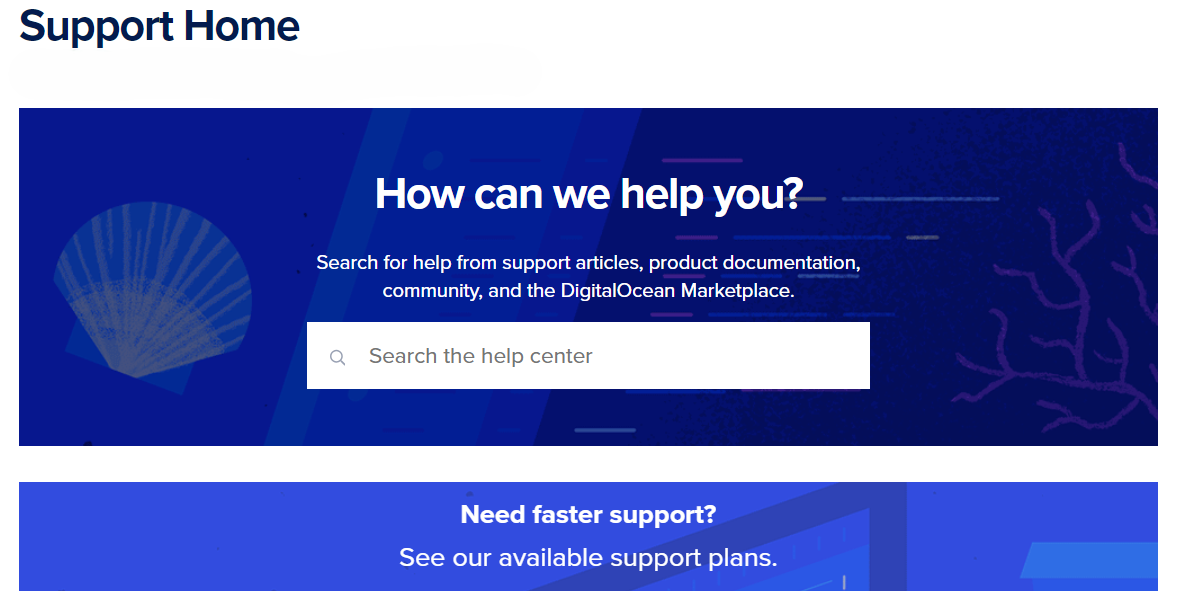
DigitalOcean and WestHost both offer a range of customer support options, but there are key differences. DigitalOcean provides several support levels, including email support, a 24/7 ticketing system, live chat for premium users, and a community for self-help. Their comprehensive documentation and tutorials are valuable resources for troubleshooting and getting started. The registration process is intuitive, and their control panel is user-friendly. However, DigitalOcean doesn’t offer phone support and has a stricter refund policy.

WestHost, in contrast, offers 24/7 live chat, a free US phone number, ticket submission, and email support with multiple email addresses for different departments. They also have a forum, blog, and knowledge base for self-help and community-driven support. Despite their broader range of direct contact options, customer reviews indicate mixed effectiveness and response times. Additionally, they provide a 30-day money-back guarantee for most services, which could be appealing to new users.
Digital Ocean vs WestHost: User feedback
User reviews for this hosting provider highlight its ease of use, affordability, and robust customer support. Users appreciate the simple and intuitive user interface, which simplifies the setup and management of virtual servers (droplets) and other cloud infrastructure. Many commend the company for its transparent pricing model and lack of hidden costs. However, some users mention limitations in higher-scale configurations and occasional slow customer support response times. Overall, it is highly recommended for small to medium-sized businesses and developers due to its reliable performance and reasonable pricing.
Users find WestHost to be a reliable hosting provider with minimal downtime and high-quality support. The competitive pricing is appreciated, but many users express frustration with the outdated documentation and the need for customer support intervention for tasks like updating SSL certificates. While the service itself is smooth and hassle-free, the administrative interface and outdated guides significantly detract from the overall user experience.
Digital Ocean vs WestHost: FAQ
Which platform is better suited for hosting WordPress websites?
Both DigitalOcean and WestHost offer dedicated WordPress hosting with numerous features tailored to hosting WordPress websites. DigitalOcean provides 1-Click WordPress installation and advanced functionalities through its Cloudways management. WestHost, on the other hand, includes user-friendly features like a free domain, unmetered bandwidth, and automatic backups, making either platform a viable choice depending on specific needs.
Are both platforms suitable for beginners?
WestHost is more suitable for beginners due to its user-friendly control panel (StackCP), integrated website builder, and simple one-click installations, making it easy to manage websites without extensive technical knowledge. DigitalOcean, while powerful and flexible, may overwhelm beginners due to its technical setup and developer-focused environment, although resources and community support are available to assist new users.
What are the major differences in pricing and value between digitalocean and westhost?
DigitalOcean’s pricing starts at $4/month for basic cloud hosting, scaling up based on performance needs with options for managed databases and advanced features, making it cost-effective for developers. WestHost offers more traditional plans starting at $3.75/month, with additional features like free domains and website builders, providing better value for small businesses and personal users looking for straightforward hosting solutions. Both have different approaches to pricing and value, catering to their respective target audiences.
Which platform offers better customer support?
WestHost provides a broader range of customer support options, including 24/7 live chat, phone support, email, and a dedicated migration center, making it more accessible for users needing direct assistance. DigitalOcean offers multiple support levels, including email support, a 24/7 ticketing system, and live chat for premium users, supplemented by extensive documentation and a community forum, but lacks phone support. Overall, WestHost’s customer support is more accessible, while DigitalOcean relies heavily on self-help resources.
Which hosting service offers more scalability options for growing websites?
DigitalOcean offers superior scalability with its elastic scaling options through customizable Droplets, allowing automatic adjustments based on need without manual intervention, ideal for handling traffic spikes. WestHost provides scalable VPS options but relies more on plan-dependent upgrades, making it less convenient compared to DigitalOcean’s flexible and automated scaling capabilities, making DigitalOcean the better choice for growing websites.
Which service is more suitable for hosting a high-traffic website?
DigitalOcean is more suitable for hosting high-traffic websites, offering high performance, a 99.99% uptime SLA, real-time alerts, and robust infrastructure with data centers across 14 locations. These features ensure excellent reliability and efficiency, catering well to high-traffic environments. WestHost, while reliable, does not provide the same level of explicit uptime guarantees and advanced scaling features, making DigitalOcean the preferred option for high-traffic websites.
The making of this blog
We followed a clear, step-by-step process to write and research this article.









